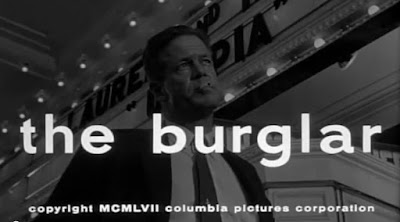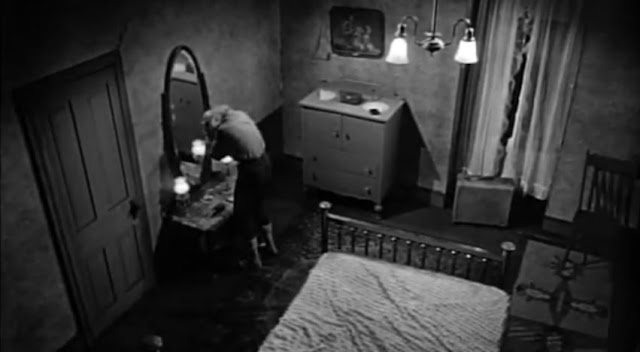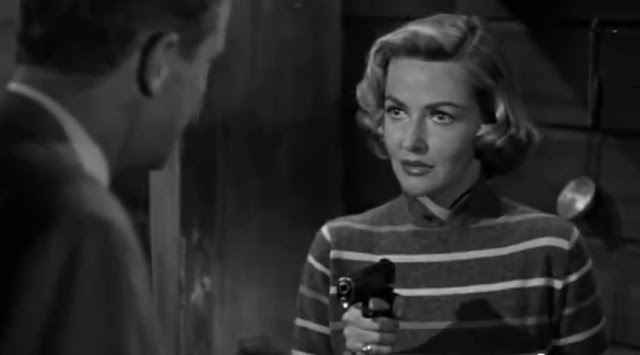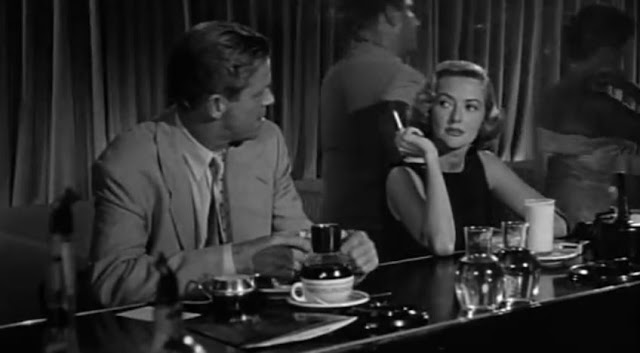The Burglar is more than just a cut above average film noir, as well as being that rare cinematic item ― a Dan Duryea leading role.
To begin with there is mood and atmosphere. Everyone working on this picture knew what they were doing by this point, the very end of the film noir show.
Insofar as plot chops, The Burglar is not dissimilar to The Asphalt Jungle, in the way in which the leading guys seem to be led on down and down, into fates more awful, peculiar and hopeless. The direction from Paul Wendko has style aplenty, oblique angles, super-sweaty close-ups and even some shock cutting, which adds huge amounts of class.
And then there is the beginning newsreel passage ― and the amusement arcade ending. I would wonder here if director Paul Wendko is trying to tell us something about his admiration for Orson Welles? These would appear to be samples from Citizen Kane and Lady from Shanghai, respectively.
Some of that may be down to a slightly weak script which hobbles the supporting cast in particular ― but yet the ragged troupe form a screen crime family nonetheless,
The family cohere and best of all are perfectly embedded in the seedy backgrounds where they wind up ― a great set of locations, including the soggy marshes which perfectly match the national and personal quagmires. Film noir has grown old here and reached the period of being self-consciously arty in exactly the same way that Kubrick’s The Killing (1956) is old. It knows what it's doing, which is heading straight for a series of brick walls.
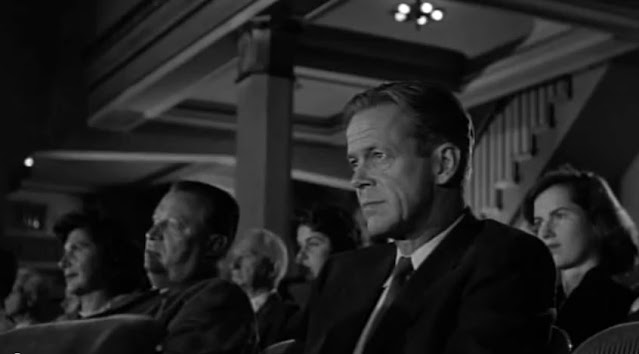 |
| Dan Duryea watching the newsreel in The Burglar (1957) |
Heist noir is a massive subject in its own right, and the heist remains a movie staple. There is a clear moral imperative here, driving a fat social wedge between earning and taking, and then inadvertently blurring that wedge so that nobody knows what side their American Dream is really buttered on.
From the earliest days, and through until the era waned, heist noir was huge ― The Killers (1946) ― Criss Cross (1949) ― The Asphalt Jungle (1950) ― Rififi (1955) ― The Killing (1956) ― Odds Against Tomorrow (1959). Even if The Burglar is not a classic film noir, its subject matter does not disappoint.
In all these stories, too, cliché becomes useful, although the most common one to prevail is the "one last job before I retire" cliché ― still being used in the film Thief (1981) ― and still being used today, as it will be tomorrow.
The Burglar cuts a fine figure as a transitional movie from noir to neo-noir. It carries the sex and intrigue of the earlier film noir style, with its choice and well-executed heist-gone-wrong moments; its occasional default to police procedural; and its fatal femme fatale chops in the moody figure of Jayne Mansfield.
Ultimately it is the existential portrayal of the criminal lead as a character locked in an ultimately doomed paradigm ― criminal freedom. In the film noir world of crime there are thugs and thieves, hoods and psychopaths ― but these are often less sophisticated types than that ultimate film noir man ― the existential.
The existential was a character born of the 1940s, and in his and her own by the 1950s. Real life existentialism had already broken out in Europe, most especially in France in the fields of literature and philosophy. The vision of the French and other European thinkers was quickly made quite real in popular culture.
This was a perfect marriage for film noir. Existentialism at its core asks questions of the self, the place in the world of the self, and questions the search for meaning, whether it be religious, social or otherwise. The draw of existentialism for noir is manifold; first there is an over all theme of the individual being lost in a meangingless and unpredictable world.
Also, film noir often places these lost individuals on trajectories that may in theory be within their control. Decisions are made, but bad decisions in film noir cost plenty, and one of the great dramatic innovations of film noir, was the absolutely random event that unravels everything.
On purely visual cues, the existential criminal spends a lot of screen time staring into space, as Dan Duryea certainly does here. The hero is also usually pretty sage, at least in comparison to the impulsive animals who surround him ― and whom often let him down. And often in the existential, we find a graver set of issues yet ― his immunity to sex.
Perhaps this immunity is some kind of cinematic joke ― the very idea that a man might be immune to the charms of a woman like Jayne Mansfield ― here, her own tragic Hollywood creation and wish fulfilment.
Perhaps the existential really is a superman, or perhaps just a homosexual? That he can view the material charms of the female world with such a lack of interest points to something either superior, or separate ― and perhaps this super-sexual indifference points to the candid disregards for true life and living that the existential represents.
Either way, this is a brand new type of hero, and a type that was going to be popular for many years.
As if to prove these credentials there is a scene of classical sexual Americana in an Atlantic City bar in The Burglar, as sexually nihilistic as it goes. It is a blueprint for the heartless, an evil chat-up, and end of the line collision between people who have run out everything ― in real life they might well have run out of sobriety and good looks too ― although not here.
Della: What's your name?
Nat Harbin: Nathaniel... Say, what is this? What do you want?
Della: Basically - basically, I'm out to find myself a man. Wait for me outside.
Nat Harbin: Are you kidding?
Della: No. No, Nathaniel, I'm not kidding.
Nat Harbin: Well, that's tough on you. Sorry, no sale.
Della: [slaps Nat] Just to let you know, I'm - not selling anything
The scene is standout as representative of the final crimes of the existentially motivated hero and heroine. They have no special family or social bond; they can merely collide, and we can delight in jealousy that such things don’t happen to us ― of course safe in the knowledge that they don’t and may never.
The actor here is Martha Vickers, playing all sides as a truly defining film noir vision. She’s everything in fact, and that includes a satisfying conclusion. To look at every film noir relationship as an inverted and evil marriage, we see predation, and the suspenseful conclusion ― death. It is a psychological death that’s achieved although in real terms ― The Burglar is pretty violent, and the action feels real. Being shot in the face ― feels real.
Della: [sitting at a bar, smoking a cigarette] My name's Della. I said, my name's Della.
Nat Harbin: What goes here?
Della: The situation.
Nat Harbin: You do this all the time?
Della: No, of course not. You know I've never done it before.
Nat Harbin: How would I know?
Della: You just know, that's all. You're looking at me and you know.
